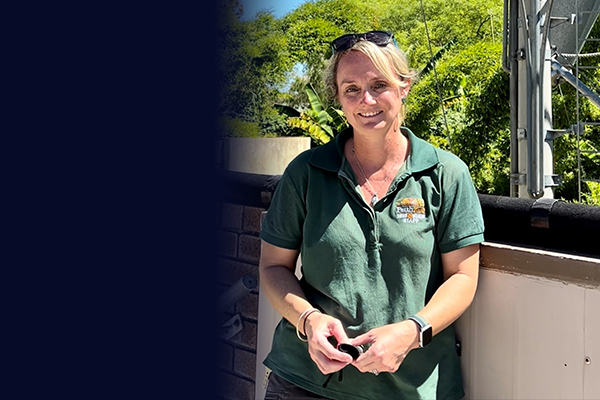Posted Thursday, 17 April 2025
$100 million boost for Scitech to inspire next generation of scientists
Scitech has welcomed the Labor Government’s election promise of a $100 million investment to support a major upgrade.
Scitech is open this Easter long weekend - 9am to 4pm!
Scitech is open this Easter long weekend - 9am to 4pm!
Scitech is open this Easter long weekend - 9am to 4pm!
Scitech is open this Easter long weekend - 9am to 4pm!
Careers in STEM (science, technology, engineering, mathematics) industries is constantly evolving, very diverse and there are multiple fields to consider. It can be overwhelming to choose and understand what education, skills and training you might need for a job you are interested in.
One career you may not have thought of, but involves a fair amount of STEM is being a Zookeeper! Meet Martina Hart who is a Primate Keeper at Perth Zoo and she spoke to us about her job and the types of STEM skills you need.

Scitech spoke to Martina Hart, Primate Keeper at Perth Zoo on her role as a zookeeper and what STEM skills are involved in her work.
1. What made you decide to become a zookeeper?
As far as I can remember, I’ve always loved animals. It wasn’t necessarily a conscious decision to be a zookeeper to be honest. I did Conservation Biology at Murdoch with an idea of doing something animal related. I did 10 weeks of work experience at Perth Zoo at the end of my degree, at one day a week.
2. What do you do?
Our day as a keeper is quite routine. As a standard we start the day with a team meeting, then it’s down to section and we start with a check of our animals and their first feed of the day. Each primate round varies, but as a rule we all do our own food preparation for the day, feed and check our animals, medicate if necessary, do behavioural observations and give out enrichment, give public keeper talks, train most of the individual primates, and of course we clean exhibits and night quarters!
3. How did you get the job at Perth Zoo?
I was lucky enough to do work experience at the zoo while finishing my university degree and was offered a two week contract just afterwards to cover someone else’s leave. That contract turned into more contracts. I then moved overseas to work at Dublin Zoo to gain more experience, and when I returned, got a permanent position on the Primate team.
4. What do you love about the job?
That’s a tough one – I love almost everything! Perhaps the biggest thing is that I get to work with and learn from the most incredible animals, and also a very passionate, cohesive team of colleagues. Some of my longest friendships have been made at Perth Zoo and I’m very grateful for that. I’ve also been lucky to work with some really special individual primates, and feel honoured to have been even a small part of their lives.
6. What STEM skills do you need?
Zookeeping is much more than feeding animals and cleaning cages, there’s a lot of extra research involved, and a lot of us are also involved in conservation programs outside of work. You need to work well in teams as it’s really important that we are a cohesive team to get the best outcomes for our animals.
We use all aspects of STEM as zookeepers. We all have a Science-based background which is especially important for researching skills. Today we use Technology constantly, in order to for example, track released animals in the wild, or to keep our animals’ records which are online. Engineering is essential for exhibit design, and the design of different enrichment devices to keep our animals active and happy. And Maths is necessary for working out and organising dietary amounts for animals or medications.
7. As a zookeeper, can you specialise in a particular area?
You can! Most people will try to go to animals they are interested in, but at the same time will take work wherever they can! Some people prefer the physical work, others prefer to be in a research environment. But I do know people who come to us convinced they 100% only want to work with one type of animal (eg kangaroos), end up doing a bit of work with animals on a different section (gibbons), and their mindset completely changes!
8. Do you work with other zookeepers, scientists, biologists etc on projects such as conservation or research?
Absolutely. It’s really important to share information with your peers. In today’s day and age, its also so easy to get in touch with people on the other side of the world via email and social media.
Upon clicking the "Book Now" or "Buy Gift Card" buttons a new window will open prompting contact information and payment details.